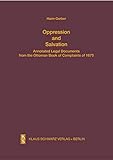Oppression and Salvation : Annotated Legal Documents from the Ottoman Book of Complaints of 1675 / Haim Gerber.
Material type: TextSeries: Studien zur Sprache, Geschichte und Kultur der Turkvölker ; 27Publisher: Berlin ; Boston : De Gruyter, [2020]Copyright date: ©2020Description: 1 online resource (188 p.)Content type:
TextSeries: Studien zur Sprache, Geschichte und Kultur der Turkvölker ; 27Publisher: Berlin ; Boston : De Gruyter, [2020]Copyright date: ©2020Description: 1 online resource (188 p.)Content type: - 9783879974726
- 9783112209400
- 340
- online - DeGruyter
- Issued also in print.
| Item type | Current library | Call number | URL | Status | Notes | Barcode | |
|---|---|---|---|---|---|---|---|
 eBook
eBook
|
Biblioteca "Angelicum" Pont. Univ. S.Tommaso d'Aquino Nuvola online | online - DeGruyter (Browse shelf(Opens below)) | Online access | Not for loan (Accesso limitato) | Accesso per gli utenti autorizzati / Access for authorized users | (dgr)9783112209400 |
Browsing Biblioteca "Angelicum" Pont. Univ. S.Tommaso d'Aquino shelves, Shelving location: Nuvola online Close shelf browser (Hides shelf browser)
Frontmatter -- Table of Contents -- Acknowledgement -- A note on transliteration -- Introduction -- Part I: Background Studies -- Chapter 1: Law and Order -- Chapter 2: The Rise of Ottoman Scholars (ulema) -- Chapter 3: State, Bureaucrats, and Scholars: the Evidence of the Book of Complaints -- Part II: The Şikayet Defteri: The Documents -- Chapter 4: Oppression and Brigandage -- Chapter 5: The Kadi and the Common People -- Chapter 6: (In)justice by State Officials -- Chapter 7: Complaints Against Kadis and Naibs (Assistant Judges) -- Chapter 8: Shari’a Court Decisions—Final? -- Chapter 9: The Agent (mübaşir) -- Chapter 10: The Role of the Divan in the Legal Process -- Chapter 11: Miscellaneous -- Glossary -- Bibliography
restricted access online access with authorization star
http://purl.org/coar/access_right/c_16ec
The phenomenon of complaints was a central tenet in the ideology of the Ottoman Empire, an obsession it inherited from former Middle Eastern empires, Islamic and pre-Islamic. Attention was directed in particular to the tendency of state officials to overstep the bounds of their authority, exploiting vast areas of the countryside to enrich themselves at the expense of the poor citizens and, as a consequence, to undermine the legitimacy of the ruler himself. On the other hand, so many complaints of harsh abuses might give the impression that the Ottoman Empire in its entirety should have collapsed as a consequence. In the first place, the Şikayet Defteri is a legal document because many of the complaints stem from the point of departure that a certain Shari’a law has been broken, violating the natural rights of certain groups of citizens. More important than this, however, the Şikayet is a legal document from an additional, methodological perspective: the document provides a perspective on the Kadi, his court, and his position in the state, which are unlikely to be obtained from any other source. Particularly, such information cannot be had from the Kadi record (sicill) itself, as this source only looks at itself from the inside, solving day-to-day problems.
Issued also in print.
Mode of access: Internet via World Wide Web.
In English.
Description based on online resource; title from PDF title page (publisher's Web site, viewed 27. Jan 2023)









